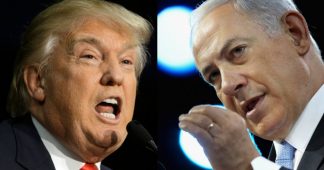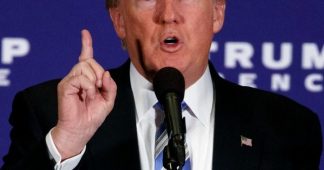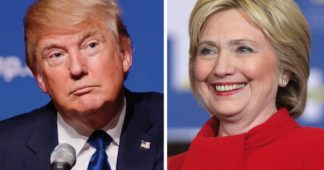By Curtis Stone
The rise of Donald Trump has plunged the world into a period of deep uncertainty about the policies and impact of the next U.S. administration. For China, the big question is what U.S foreign policy will look like with the next administration.
Nobody knows what to expect, and the deep uncertainty surrounding Trump has been compounded by his contradictory statements and lack of details on how he will address the world’s problems. However, Beijing is confident that the world’s most important bilateral relationship will remain strong. Soon after Trump’s victory, Chinese President Xi Jinping congratulated the President-elect, and President Xi said he hoped they could work together to boost China-U.S. relations.
But despite the confidence, deep uncertainty remains.
A return to 1980 politics?
Trump views Ronald Reagan as “a truly great President,” and he sees himself as the next Reagan, at least according to his tweets. The 2016 presidential election also shares some parallels with 1980. Presidential candidate Reagan claimed that America’s strength was being eroded by President Jimmy Carter, and he blamed the President for destroying confidence in the nation’s strength. In October 1980, presidential candidate Reagan gave a major speech entitled, “A Strategy for Peace in the 80s.” Reagan argued that peace is made by economic, military, and strategic strength; and is lost when such strength disappears or is seen as disappearing. “We must build peace upon strength. There is no other way,” Regan said.
Trump will almost certainly follow Reagan’s example. If so, Trump will place America’s national interests over foreign policy and follow the axiom of “build peace through strength.” But a striking difference remains. Reagan valued the bilateral relationship:
Our relationship with the Peoples Republic of China is in its beginning stages. It is one that can and will grow, and I repeat my intention to assist its rapid growth. There is an historic bond of friendship between the American and Chinese peoples, and I will work to amplify it wherever possible. Expanded trade, cultural contact and other arrangements will all serve the cause of preserving and extending the ties between our two countries.
Will Trump pivot away from the pivot?
It is unlikely that the pivot will fade under Trump. In fact, it will probably have a harder edge. The Pentagon has been pushing for a stronger military presence in the region, but has been constrained by the White House. After Trump is sworn into office, America will be under single-party rule for at least two years, because the Republican Party has control over the U.S. Congress. With Trump in office, the Pentagon could get its way. Trump has already stated his intention to increase defense spending, and his vision for national security includes adding 350 ships to the U.S. Navy. Increased military presence in the Asia-Pacific is likely.
No one knows how Trump will approach China, but we do know how some of those around him will approach China. In February 2012, Trump endorsed Mitt Romney for president not because he agreed with him on every issue, he tweeted, but “because he will get tough with China.” Shortly after the endorsement, Romney published a commentary entitled, “How I’ll Respond to China’s Rising Power.” The next day, Trump tweeted that Romney “gets the China problem.” Romney’s plan can be used as a proxy method to understand how Trump might respond to China. Romney argued that the inherent strength of the nation depends on three strengths: economy, military, and values; and that those three strengths must be restored and then applied in policy toward China. Trump’s approach should not differ greatly.
Trump’s inner circle will influence his thinking and push back when needed. Two of those people are Mike Pence, the vice-president elect, and James Woolsey, a former director for the CIA and a senior adviser to the President-elect on national security, defense, and intelligence.
Pence is a strong supporter of free trade and trade partnerships. According to Vote Smart, a website that provides information on candidates and elected officials, Pence voted yea for every free-trade agreement that came before him. At least two of the agreements favored freer trade with China. Pence voted to keep the U.S. in the World Trade Organization and to maintain China’s normal trade relations status with the U.S. in June 2001 and March 2005, respectively. His support for free trade and trade partnerships puts him at odds with Trump, who has vowed to scrap trade deals. In June 2016, Trump praised Britain for taking back their country during a trade speech in Pennsylvania. “Now it’s time for the American people to take back their future,” Trump said.
Woolsey’s influence will loom large on China-U.S. relations. On November 10, he offered a peek at the future in an op-ed entitled, “Under Donald Trump, the U.S. Will Accept China’s Rise – As Long as It Doesn’t Challenge the Status Quo.” Woolsey recognized China’s leadership role, but also said that the balance of power in Asia depends on America’s strength. He signaled major policy change. He called U.S. opposition to the formation of the Asian Infrastructure Investment Bank “a strategic mistake,” and said that the new administration should warm up to the Belt and Road initiative. He expressed hope for a new agreement between the two sides. “I can…see the emergence of a grand bargain in which the U.S. accepts China’s political and social structure and commits not to disrupt it in any way in exchange for China’s commitment not to challenge the status quo in Asia,” Woolsey said.
Deep uncertainty surrounds Trump, but that does not change the importance of the bilateral relationship. China and America depend on each other, so it is critically important for them to work together to strengthen the relationship. Pulling back would weaken America and create even more uncertainty. To make America stronger, Trump must strengthen the China-U.S. relationship by taking full advantage of its benefits, because America’s strength depends on China’s strength.











